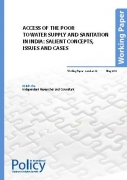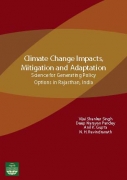Policies, Laws and Regulations
Guidelines for water safety plans for rural water supply systems by the Sulabh International Academy of Environmental Sanitation
Posted on 27 Dec, 2010 07:20 PMThis document by the Sulabh International Academy of Environmental Sanitation presents the guidelines for water safety plans for rural water supply systems. The revised National Rural Drinking Water Programme (NRDWP) Guidelines 2009-2012 issued by Rajiv Gandhi National Drinking Water Mission, Department of Drinking Water and Sanitation has shifted the focus from source development and installation of water supply system for providing drinking water supply to rural household to focus on development of village security plan.
Interlinking of Rivers - Third report of the Standing Committee on Water Resources (2009-2010)
Posted on 27 Dec, 2010 04:55 PMThis report of the Standing Committee on Water Resources deals with the action taken by the Government on the recommendations and observations contained in their Eleventh Report on “Inter Linking of Rivers” which was presented to Lok Sabha in October 2008.
The Dam Safety Bill (2010) – Ministry of Water Resources
Posted on 27 Dec, 2010 11:00 AMThe Dam Safety bill, 2010 introduced in the Lok Sabha in August 2010 and approved by the cabinet earlier this year was referred to the Standing Committee on Water Resources, which was scheduled to submit its report within three months. The bill which is still pending seeks to provide for the surveillance, inspection and operation of all dams of certain parameters to ensure their safe functioning.
Preparation of strategic plan for rural drinking water sector in India – A draft discussion paper by the Department of Drinking Water Supply
Posted on 26 Dec, 2010 07:27 AMThis draft discussion paper by the Department of Drinking Water Supply (Ministry of Rural Development) deals with the preparation of strategic plan for rural drinking water sector in India. The Government of India introduced the Accelerated Rural Water Supply Programme (ARWSP) in 1972–73 to support States and UTs with financial and technical assistance to implement drinking water supply schemes in order to accelerate the pace of coverage across rural India.
Saving rice - Ambitious plans to increase productivity
Posted on 24 Dec, 2010 10:13 AMEnormous funds are being poured into research aimed at improving seed varieties, with a heavy focus on developing hybrid rice. Is it the right option for millions of small rice farmers who are already battling high input costs and increasingly unpredictable weather? Or does part of the solution lie in efficient methods of cultivation that will cut down water use and improve yield?
Access of the poor to water supply and sanitation in India - Salient concepts, issues and cases by the International Policy Centre for Inclusive Growth
Posted on 20 Dec, 2010 10:04 PM This paper by the International Policy Centre for Inclusive Growth deals with access of the poor to water supply and sanitation in India. It argues that economic, technical, institutional as well as social factors constrain access to safe drinking water and proper sanitation in India for both the urban and rural poor, and that coverage figures do not reflect this restricted access. It finds that, increasingly, communities are being required to manage their own water and sanitation schemes, not just in rural areas but in urban ones as well.
This paper by the International Policy Centre for Inclusive Growth deals with access of the poor to water supply and sanitation in India. It argues that economic, technical, institutional as well as social factors constrain access to safe drinking water and proper sanitation in India for both the urban and rural poor, and that coverage figures do not reflect this restricted access. It finds that, increasingly, communities are being required to manage their own water and sanitation schemes, not just in rural areas but in urban ones as well.
The paper deals with domestic water supply and sanitation and presents a historical overview of the phenomenon in rural and urban India. This is followed by a critique of available figures for coverage which, it is contended, seem exaggerated because they do not account for the several constraints to access. It addresses the specific institutional problems faced in the public sector delivery of these two utilities in India apart from dealing with the parallel yet thus far limited presence of the private sector in these twin arenas.
Climate change impacts, mitigation and adaptation - Science for generating policy options in Rajasthan
Posted on 20 Dec, 2010 09:14 PM This paper by Rajasthan Pollution Control Board on climate change impacts in the context of Rajasthan seeks to address the issue of need of the society for robust knowledge to pursue strategies for mitigation as well as adaptation in order to address the challenges associated with global warming and climate change.
This paper by Rajasthan Pollution Control Board on climate change impacts in the context of Rajasthan seeks to address the issue of need of the society for robust knowledge to pursue strategies for mitigation as well as adaptation in order to address the challenges associated with global warming and climate change.
Accordingly, here a brief review of the available literature and an annotated bibliography of published research on climate change impacts, mitigation and adaptation in order to facilitate the identification of policy options in Rajasthan is provided.
Also included is the literature on how human societies contribute to environmental change and how, in turn, become vulnerable to these changes. It also explores the available knowledge on how likely ecosystem goods and services are impacted to climatic oscillations (environmental sensitivity) and the ability of rural communities to cope (social resilience) with those changes.
Environmental compliance of hydel projects in Himachal Pradesh - Shukla committee report (2009)
Posted on 20 Dec, 2010 12:43 AMThe terms of reference for monitoring included the following:
Preparation of City Sanitation Plans for select cities in India - Consultation workshop organised by MoUD, MoEF and GTZ-ASEM (April 2010)
Posted on 14 Dec, 2010 09:37 PMA two day workshop was conducted on 15-16 April 2010 at Bangalore by GTZ-ASEM and supported by the Ministry of Urban Development (MoUD) and the Ministry of Environment and Forests (MoEF) regarding preparation of City Sanitation Plans.
The Ministry of Urban Development (MoUD) has undertaken the preparation of the City Sanitation Plans (CSPs) under the National Urban Sanitation Policy (NUSP) since the year 2008.
Groundwater quality in shallow aquifers of India – A report by the Central Ground Water Board
Posted on 14 Dec, 2010 07:54 AMThis report by the Central Ground Water Board entitled ‘Ground Water Quality in Shallow Aquifers of India’ is an outcome of the follow up of one of the important recommendations of the second meeting of the Advisory Council on Artificial Recharge to Ground Water during September 2007. It attempts to summarize various aspects of groundwater quality in the shallow aquifers in the country with special reference to six parameters viz. salinity, chloride, arsenic, fluoride, iron and nitrate.